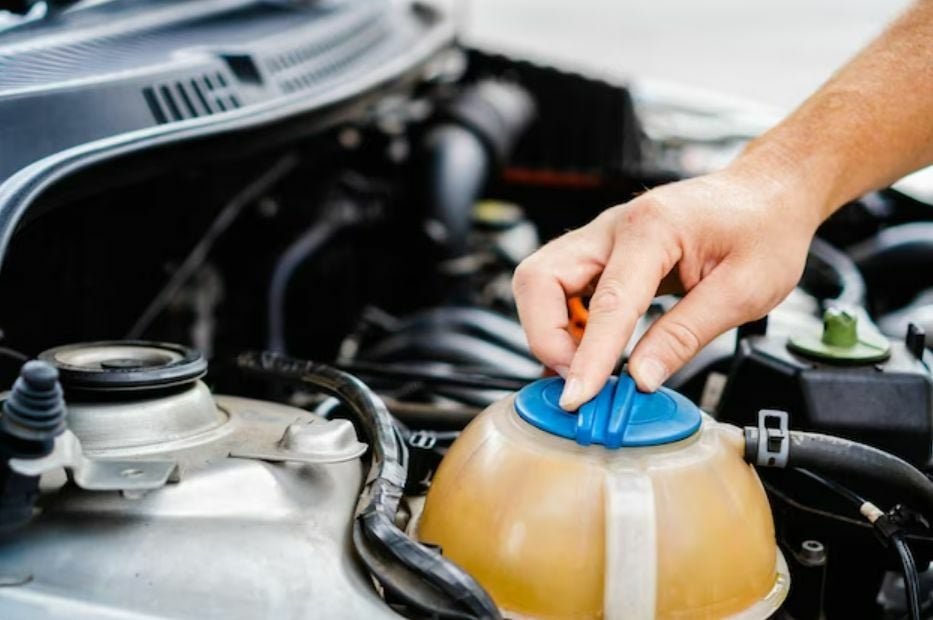Essential tips for maintaining your car’s cooling system

A car’s cooling system is an essential component of an automobile, designed to regulate the temperature of the vehicle’s engine and prevent it from overheating. The car cooling system ensures that the engine operates within an optimal temperature range, which is crucial for maintaining its performance, efficiency, and longevity.
Comprised of various interconnected parts, such as a radiator, water pump, thermostat, and coolant, the car cooling system works together to dissipate heat generated by the engine during combustion, ultimately keeping the engine cool and functioning smoothly. A well-maintained cooling system is vital for the overall health of a vehicle, as it helps to safeguard the engine from potential damage caused by excessive heat.
Top tips to maintain your car’s cooling system
Regular coolant checks

It’s important to check the coolant level regularly, preferably every time you change your engine oil. Make sure the coolant is filled to the proper level and top it off if necessary. Always ensure the engine is cool before opening the radiator cap to avoid burns from hot coolant or steam.
Regular coolant checks are important for maintaining the efficiency and performance of a car’s cooling system. The coolant is responsible for absorbing heat from the engine and transferring it to the radiator, where it is dissipated into the surrounding air. Over time, the coolant level may decrease due to evaporation or small leaks, which can compromise the cooling system’s ability to regulate the engine temperature. By performing regular coolant checks, you can ensure that there is an adequate amount of coolant in the system to protect the engine from overheating.
Coolant flush

A coolant flush plays a crucial role in preserving the effectiveness and functionality of a car’s cooling system. Over time, the coolant can become contaminated with rust, scale deposits, and other debris, which can reduce its ability to absorb and transfer heat effectively. These contaminants can also cause blockages in the cooling system, leading to restricted coolant flow and potential overheating of the engine.
Performing a coolant flush involves draining the old, contaminated coolant from the system and replacing it with fresh, clean coolant. This process helps to remove any built-up contaminants and ensures that the cooling system can function at its optimal capacity. By maintaining the quality of the coolant, a flush safeguards the engine against excessive heat and potential damage, ultimately prolonging the life of the vehicle and preventing costly repairs.
Inspect hoses and belts

Inspecting hoses and belts is essential for the reliable operation of your vehicle’s car cooling system. By regularly examining these components, you can identify signs of wear, cracks, or leaks that may compromise the system’s ability to regulate engine temperature properly.
Timely detection and replacement of worn-out hoses and belts can prevent sudden failures, coolant leaks, and potential engine overheating, ultimately contributing to the longevity and performance of your vehicle.
Thermostat check

A thermostat check plays a significant role in maintaining the efficiency of a car’s cooling system. The thermostat is responsible for controlling the flow of coolant between the engine and radiator, ensuring the engine operates within its optimal temperature range.
By periodically examining the thermostat, you can detect any malfunctions that may cause overheating or insufficient cooling of the engine. Addressing thermostat issues promptly helps preserve the car’s cooling system, supporting optimal engine performance and preventing potential damage caused by temperature fluctuations.
Radiator maintenance

Radiator maintenance is essential for the optimal performance of a car cooling system, as it directly influences the engine’s temperature regulation. By keeping the radiator clean, free of debris, and in good condition, you ensure that it can effectively dissipate heat absorbed from the engine via the coolant.
Proper radiator maintenance helps to prevent leaks, corrosion, and airflow obstructions that may hinder the cooling process. As a result, you can avoid engine overheating and prolong the life of your vehicle while maintaining its efficiency and performance.
Water pump inspection

Water pump inspection is crucial for the proper functioning of a car cooling system, as it is responsible for circulating coolant throughout the engine and radiator. By regularly examining the water pump for leaks, unusual noises, or signs of wear, you can address potential issues before they escalate, ensuring uninterrupted coolant flow.
Cooling fan operation

Cooling fan operation is vital for the overall efficiency of a car cooling system, as it directly contributes to the heat dissipation process. The cooling fan draws air through the radiator, helping to lower the temperature of the coolant after it has absorbed heat from the engine. Ensuring that the cooling fan functions properly and turns on when needed allows for more effective temperature regulation, preventing the engine from overheating.
Monitor engine temperature

Monitoring engine temperature is essential for maintaining a car cooling system’s effectiveness, as it provides valuable insight into the system’s performance. By keeping an eye on the engine temperature gauge, you can identify any irregularities or fluctuations that may indicate issues with the cooling system, such as low coolant levels, leaks, or a malfunctioning thermostat. Timely detection and resolution of these issues help prevent engine overheating, which can cause costly damage to the engine and its components.
Regular servicing

Follow your vehicle’s maintenance schedule and have regular check-ups with a professional mechanic. They can help identify potential issues with your car’s cooling system before they become major problems, ensuring that your engine stays cool and performs optimally. By keeping up with routine maintenance, you can extend the life of your vehicle and avoid costly repairs due to cooling system failures.
Latest Thailand News
Follow The Thaiger on Google News:


























